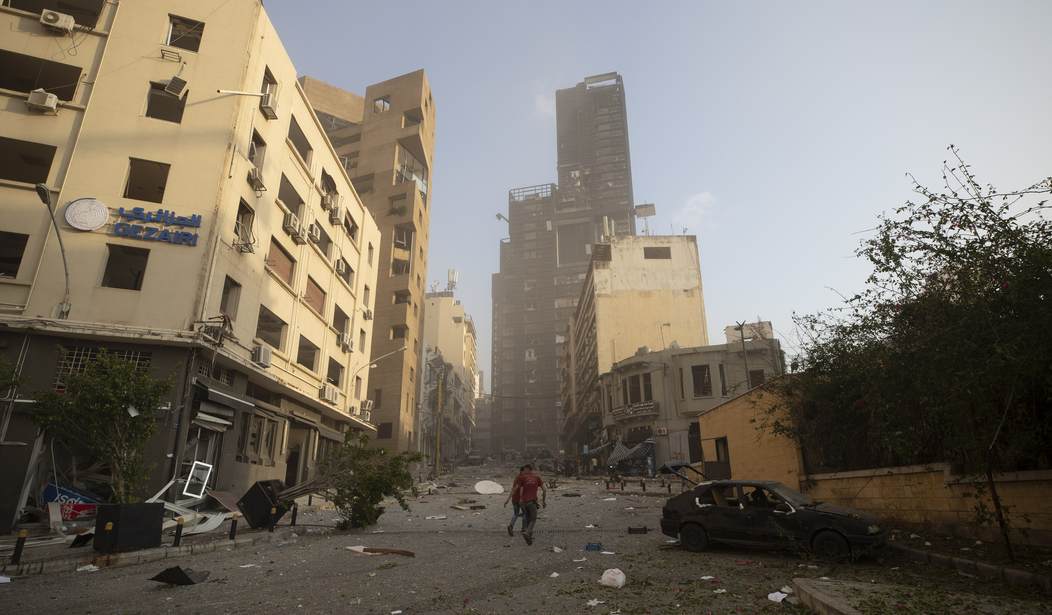On Tuesday evening 2,750 tons of apparently neglected ammonium nitrate exploded in a warehouse at Beirut’s port. The results include at least 135 dead, over 5,000 injured, and 300,000 left homeless. Even before the calamity, Lebanon was in a state of economic collapse with inflation running wild, over 30 percent unemployment, and the Lebanese pound pegged at about 1,500 to the dollar.
Since then Israel has been trying persistently to help, offering Lebanon medical and other humanitarian aid through UN channels. Considering that Lebanon is controlled by Hizballah, which sees Israel as a Little Satan with no claim to exist at all, that may seem to be a fool’s errand.
The Jerusalem Post reports that “the UN is considering opening up a field hospital in Cyprus” with an international medical team, and quotes an Israeli hospital director who says Israeli doctors could probably join that team: “If there is an international delegation then Lebanon won’t put any condition that there not be Israelis — that would be absurd.”
Absurd, yes — but this is the Middle East.
The Post adds that Israel is reportedly “negotiating sending equipment to detect missing people under collapsed buildings, medical equipment and to treat people who were injured who have foreign citizenship.”
In the Middle East, though, this is the sort of offer that can be refused.
True, during the Syrian civil war Israel treated thousands of Syrians in its hospitals — with some of the Syrians initially terrified to encounter monstrous “Zionists” and later being grateful for their treatment.
It’s also true that in the past Israel closely cooperated — militarily — with the Lebanese in the form of the South Lebanon Army, a militia that included both Christians and Shiites and joined Israel in fighting Hizballah from the early 1980s until Israel’s withdrawal from Lebanon in 2000.
But the Syrian civil war was a state of true chaos, and the Israel-South Lebanon Army collaboration occurred in an era before Iran’s proxy Hizballah had taken full control of Lebanon.
Offering aid via the UN in the wake of a disaster, however, even if there is scant to no chance at all that any aspect of the offer will be accepted, is one thing. On Wednesday night, though, Tel Aviv’s veteran left-leaning mayor Ron Huldai of the now nearly defunct Labor Party went one further, ordering Tel Aviv’s city hall to be lit up with the Lebanese flag.
It sparked anger from many in Israel, with one cabinet minister saying that, while he didn’t oppose humanitarian aid, “waving an enemy flag in the heart of Tel Aviv is moral confusion.”
But Huldai’s gesture got an even worse reaction from the Lebanese themselves. As the (left-of-center) Times of Israel put it: “If you thought the backlash…was strong inside Israel, try the backlash inside Lebanon…. Using the hashtag ‘We don’t want it,’ many Lebanese expressed their rejection of both Israeli solidarity and offers of medical aid.”
One of them, a Twitter user named Mohammad Ali Sakar, wrote: “We will be the ones to light up Tel Aviv — with our rockets. Tel Aviv is already lit by the ghost of Imad and Jihad [Mughniyeh]” — referring to two Hizballah leaders, a father and son, believed to have been assassinated by Israel.
Jamal Chaitto tweeted: “Israel is the largest source of martyrs and wounded in all of Lebanon…it is absolute evil. Working with it is forbidden.”
Saad Dai’ri was also blunt: “We don’t want anything from you, you are our enemies…you who killed the children of Qana” — referring to an errant Israeli artillery shell that killed civilians in the Lebanese village of Qana in 1996.
But “some,” The Times of Israel says, “appeared to disagree, saying that they welcomed Israeli aid.” It quotes one of them, Hussein Nasr of southern Lebanon, who tweeted: “But we do want it — peace, that is. Screw Iranian ideas.”
Israel offers humanitarian aid in such a situation because it wants to keep itself above the Middle Eastern ethos of tribal hatreds and signal benign intentions — knowing at least a few will pick up on the signal. Flaunting a pretend “solidarity” like Mayor Huldai did is something else, a kind of self-abasement still found on the shrill but much-diminished Israeli left.
P. David Hornik, a longtime American immigrant in Israel, is a freelance writer, translator, and copyeditor living in Beersheva. In addition to PJ Media his work has appeared in FrontPage Magazine, National Review, New English Review, American Spectator, American Thinker, The Times of Israel, the Jerusalem Post, and elsewhere. Among his books are Choosing Life in Israel and the novel Beside the Still Waters, which was published by Adelaide Books in 2019.
Netanyahu Is a Peacemaker—and Don’t Think the Left Will Mention It









Join the conversation as a VIP Member